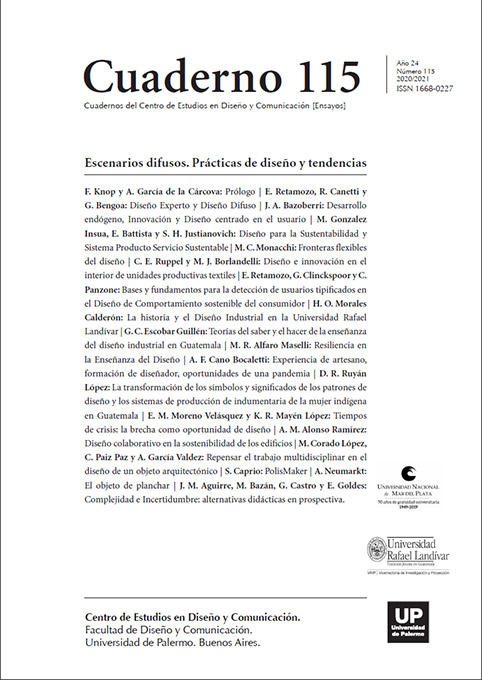Complejidad e Incertidumbre: alternativas didácticas en prospectiva. El diseño desde el 2020.
Abstract
Learning the design process, facing a fact as complex as culture, requires a flexible theoretical position and simultaneously prepared for the uncertain changes that the future faces us on a daily basis. The cultural scenarios of design are multiple and, it is in this multiplicity, where the value of its methodology lies: the design process. Contextualizing, conceptualizing, producing, distributing, marketing, using and unusing a design product / service also require particular users, different interaction contexts and specific contextualization interfaces. Each stage is, at the same time, the product of the antecedent phase and preceding process of the link to come. But, for the learning-teaching of design this is insufficient today. The disciplinary definition of Tomás Maldonado –of more than half a century ago– has been very useful and, in some of its edges, still in force. But, a reformulation of the current W.D.O. It could become partially obsolete due to the current global context and its projection in the short future.
References
o General Assembly in Guangju, Professional Practice Committee (2015). Definition of Industrial Design. Obtenido de: www.wdo.org/about/definition/
Aguirre, J. M. (2013). Diseño. Enseñanza, aprendizaje & ego-axialidad. Córdoba: Ed. FAUD UNC.
Biblioteca Open Mind (2009-2020). Ed. Fundación BBVA. Obtenida de: www.bbvaopenmind.com
Castro, H. y Zusman, P. (dic. 2009). En: Investigaciones geográficas no 70: Naturaleza y cultura: dualismo o hibridación. México: Ed. UNAM.
Fundación Juan March (2013). Paul Klee. Maestro de la Bauhaus. Madrid: Ed. Fund. Juan March.
Gombrich, E. (1999 [1979]). Ideales e ídolos. Madrid: Ed. Debate.
Gropius, W. (1963 [1937]). Alcances de la arquitectura integral. Buenos Aires: Ed. La Isla.
Harari, Y. N. (2016). Homo Deus. Buenos Aires: Ed. Debate. Jarauta, F. (editor). En: Cuadernos de diseño 3. Diseño, innovación, empresa: Presentación.
Ed. IED Instituto Europeo de Diseño. Madrid 2013 [2009].
Manzini, E. (2013 [2004]). En: Cuadernos de Diseño 1: Pensar - proyectar el futuro. Ed. IED Instituto Europeo de Diseño. Madrid.
Maschi, S. (2002). Scenari. PhD thesis. Milano: Politecnico di Milano.
Morín, E. (2004 [1990]). Introducción al pensamiento complejo. Barcelona: Ed. Gedisa.
Norman, D. A. (2010). El diseño de los objetos del futuro. Madrid: Ed. Paidós.
Ortega & Gasset, J. (1914). Meditaciones del Quijote. Ed. Imprenta Clásica Española. Obtenido de: www.books.google.com.ar
Piaget, J. (1966). Psicología de la inteligencia. Buenos Aires: Ed. Psique.
Roca, J. M. (2014). Sobre el error: Fe de erratas. Belluno: Ed La Fábrica.
Los autores/as que publiquen en esta revista ceden los derechos de autor y de publicación a "Cuadernos del Centro de Estudios de Diseño y Comunicación", Aceptando el registro de su trabajo bajo una licencia de atribución de Creative Commons, que permite a terceros utilizar lo publicado siempre que de el crédito pertinente a los autores y a esta revista.


